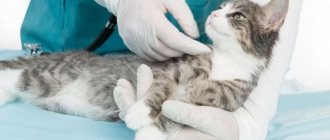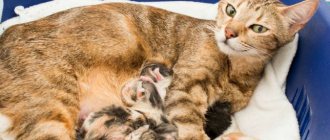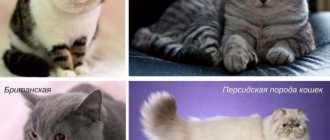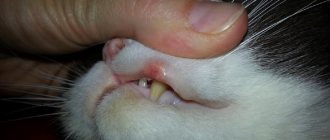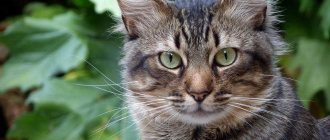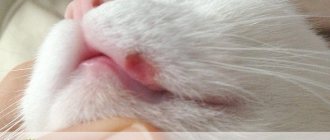Description of the disease gastroenteritis in cats
Gastroenteritis is nothing more than inflammation of the stomach and small intestine, accompanied by digestive disorders, and both of these pathological processes occur in the body of the purr simultaneously and are closely related to each other. Gastroenteritis is caused by many unrelated reasons, including defects in keeping the cat and various infections, including such dangerous ones as meningitis or coronavirus.
Attention!
According to the nature of the inflammatory process, gastroenteritis is divided into serous, catarrhal, hemorrhagic, fibrinous and purulent.
And by origin - infectious and non-infectious. In this case, the causes of infectious gastroenteritis are often diseases that pose a serious threat to the health and life of the cat.
Clinical manifestations: symptoms and causes
Symptoms
In the vast majority of cases, the cat experiences a decrease or complete absence of appetite. The animal is weakened and looks depressed.
In addition, the following signs of digestive disorders are also observed:
- Vomiting - sometimes with traces of blood or bile.
- Diarrhea - often also with blood, mucus and waste of undigested food; it can also be with signs of the presence of fat (steatorrhea, or, in other words, fatty feces).
- Abdominal pain - the cat is hunched over and acting restless.
- When palpated, her abdomen is painful and tense.
- With the purulent and hemorrhagic form of gastroenteritis, the temperature may be elevated, and pus and blood are visible in the feces, which themselves have the characteristic appearance of the so-called raspberry jelly. The animal is lethargic, apathetic and inactive.
- Due to frequent vomiting and diarrhea, dehydration can develop, during which the cat loses a lot of weight, its eyes become sunken, and the skin loses its elasticity and, if folded, it will not straighten out immediately.
- The mucous membranes are pale; if the liver is involved in the process, they may also be icteric.
- With coronavirus gastroenteritis, damage to the central nervous system is also possible: the cat may have paralysis, paresis, ataxia and seizures.
Causes
Non-infectious gastroenteritis:
- Incorrect, unbalanced nutrition: feeding low-quality, rough, spicy or too salty food, skipping feedings for no significant reason.
- Binge eating.
- Poisoning with heavy metal salts that may be present in the food.
- Food allergies.
- Side effects of medications that negatively affect the digestive system.
Infectious gastroenteritis:
- Viruses - parvovirus, coronavirus, hepatitis.
- Bacteria - E. coli, salmonella.
- Parasites - worms, isospores, coccidia.
Non-infectious diseases and pathological processes in the body:
- Diseases of the gastrointestinal tract: gastritis, liver disease, pancreatitis, intestinal obstruction.
- Accumulation of hairballs in the stomach or intestines - trichobezoars, which are caused by ingestion of hair during licking.
- Congenital or acquired defects in the structure of the digestive organs.
- Stress.
Important!
One of the most severe and dangerous forms of gastroenteritis is hemorrhagic, which often begins for no apparent reason. Scientists suggest that this disease is of an autoimmune nature, or that it can occur due to infectious diseases.
Causes and symptoms of the disease
Why is it possible for a cat to become infected with the coronary gastroenteritis virus? There are several causes and methods of infection. How is the disease transmitted?
Transfer methods:
- Oral or nasal route. The virus enters the animal's body by eating contaminated feces or by inhaling particles from trays. Even a small amount of litter from a sick cat is enough to infect other cats.
- Kittens become infected during the transition from mother's milk to another diet. While the mother feeds the kitten, the baby develops specific antibodies that protect it from various diseases. Later, the kitten’s weak immune system is not yet able to resist gastroenteritis, which becomes the cause of infection.
- A person is not able to infect a cat; the virus is not transmitted to people from sick individuals. Infection is possible from clothing or hands stained with feces.
Gastroenteritis, not caused by viruses, develops for various reasons - overeating, poisoning, allergic reactions and other pathological processes in the digestive system.
An attentive owner always monitors the condition of the pet. The symptoms of any gastroenteritis manifest themselves quite intensely, it is impossible not to notice them.
Signs:
- Decreased appetite or refusal to eat;
- Vomiting, severe diarrhea;
- Lethargic, apathetic state;
- Increased body temperature;
- When trying to eat, the animal attempts to vomit, but without vomiting;
- The abdomen is swollen, tense, painful when palpated;
- The mucous membranes are pale, with liver damage they have an icteric tint;
We recommend: What to do if your dog is poisoned by rat poison?
With the development of gastroenteritis, damage to the nerve endings is possible, the cat experiences convulsions and paralysis.
Kinds
Coronavirus
Coronavirus gastroenteritis often occurs in cats. This is not surprising, given that many of them have been carriers of coronavirus almost from birth. The fact is that the causative agent of this disease is highly virulent, or, to put it simply, the coronavirus is very contagious.
It is easily transmitted from one cat to another, and animals kept in nurseries or shelters are at particular risk, since it is their large concentration that simplifies the route of transmission of the virus.
If a cat gets sick with coronavirus, it will experience the following symptoms of the disease:
- Vomiting.
- Weak or no appetite.
- Vomiting and/or diarrhea.
- The stool is liquid, and the vomit is often yellowish and foamy.
- The animal is apathetic, its gaze becomes dull.
- The temperature usually rises.
- If you try to feed a cat, it may have so-called “dry vomiting”: the animal vomits, but no vomit is released.
Attention!
If your cat has any of these symptoms, let alone more than one, you should immediately take him to a veterinarian for diagnosis and treatment.
Non-infectious
Gastroenteritis caused by improper feeding or, for example, allergies is less dangerous for a cat than an infectious disease.
It is faster and easier to treat and, as a rule, complete recovery occurs.
But at the same time, it is necessary to remember that if the cause of the pet’s disease is not immediately eliminated and the correct diet is not chosen for it, the disease may recur.
Types of coronavirus gastroenteritis
There are two types of gastroenteritis in cats. Each type manifests itself differently.
Coronavirus
The disease is diagnosed in many individuals and is easily transmitted from one animal to another.
Caused by a virus that is resistant to the environment. It poses a serious threat to the cat's life and requires prompt treatment and attention. If suspicious symptoms are detected, the pet is taken to a veterinary clinic.
If the cat has a strong immune system, then self-cure (removal of the virus from the body) is possible.
This process takes three weeks, but in some cases the virus remains in the cat's body and continues to be excreted in the feces.
Non-infectious
Non-infectious gastroenteritis, caused by digestive pathologies, allergies and overeating in an animal, is not so dangerous. Treatment takes less time and effort.
However, if the cause of alimentary gastroenteritis (the second name of this form) is not eliminated, it will recur over time.
Diagnostics
As a rule, when there is gastroenteritis, the veterinarian will first examine the cat's mouth. With this disease, a white coating will be noticeable there, and the animal may drool profusely.
In addition, they do a general blood test and biochemistry and a stool test for worm eggs. They may also recommend doing scatology to identify blood, pus, fats and undigested food particles present in the stool.
Virological and bacteriological diagnostics are also indicated.
In addition, an X-ray examination of the intestines and an ultrasound of the abdominal cavity are performed.
If coronavirus is suspected, a separate special test is performed.
Attention!
With the hemorrhagic form of gastroenteritis, heart rhythm disturbances are often observed, and therefore an additional ECG should be performed.
What can trigger the disease?
Gastroenteritis often occurs against the background of an existing disease, and sometimes it is caused by negative external factors.
Diseases that provoke gastroenteritis:
- Meningitis.
- Pneumonia.
- Oncology and benign tumors.
- Coronavirus infection.
- Poisoning.
- Diseases of the pancreas.
- Addison's disease.
- Hyperthyroidism.
- Viral diseases.
- Escherichia coli.
- Salmonellosis.
- Intestinal volvulus.
- Pathological processes of the gastrointestinal tract, such as gastritis and pancreatitis.
- Intestinal obstruction.
- Liver diseases.
- Atherosclerosis.
- Heart diseases.
- Metabolic disorders.
- Worms.
External factors leading to gastroenteritis:
- Unbalanced diet.
- Lack of a stable pet feeding regimen.
- Binge eating.
- Poor-quality ready-made food that contains an excess of dyes and preservatives.
- Food allergies.
- Ingestion of a foreign body.
- Stressful situations.
- Excessive licking, leading to the formation of trichobezoars in the cat's stomach - hair balls made from ingested hair.
Infection process
Coronavirus is one of the most mysterious viruses known to science.
There are two strains of this pathogen found in cats: FIPV and FECV. The first of them causes infectious peritonitis, but the second is precisely the cause of infectious gastroenteritis.
As a rule, cats become infected by eating feces or sniffing them, and microscopic doses of the filler on which the causative agent has come into contact with the disease are sufficient for infection.
The virus persists in the external environment for quite a long time - up to a week, which makes it even more dangerous in terms of virulence.
There is no intrauterine transmission of the virus through the placenta. Moreover, as long as kittens receive antibodies from their mother cat’s milk, they do not get sick with coronavirus.
The “dangerous” age comes later - at 5-7 weeks, when passive immunity is already fading, and active immunity has not yet had time to develop. At this time, children are especially vulnerable and susceptible to infection with coronavirus.
But a particular danger to the health and life of cats is that the relatively harmless FECV, under the influence of certain, not fully studied factors, can mutate and turn into a deadly FIPV, causing infectious peritonitis, from which a lot of cats and, especially, kittens die. .
Important!
Even if the coronavirus has entered the cat’s body, this does not mean that it will certainly get sick. If the animal is healthy and has good immunity, then the coronavirus pathogen will be completely eliminated from its body. This process can take two weeks or several months.
For the cat itself, excretion of the pathogen along with feces is completely harmless, but at the same time it can infect other animals that have weaker immunity.
Is it transmitted to humans?
Both strains of feline coronavirus do not pose a danger to humans, and this applies to those with weakened immune systems, the elderly, and even newborn babies.
Therefore, if a cat in the family has contracted coronavirus gastroenteritis, one should not be afraid of infection and, especially, there is no need to euthanize or throw the animal outside for this reason.
Symptoms of coronavirus infection
The incubation period of the disease takes from 5 to 7 days. Symptoms of viral enteritis are divided into several categories. Depending on this, the symptoms take different forms. The following general indicators will help identify coronavirus enteritis in a dog:
Mild form of the disease
An adult dog may have no symptoms at all. The owners only notice something was wrong a few days later:
- Lack of appetite;
- Apathy;
- There is no increase in temperature;
- Possible sneezing and coughing.
Acute form of enteritis
Coronavirus is dangerous when combined with parvovirus or other infections. In this case, the following symptoms are observed:
- Lethargy and apathy;
- Refusal to eat;
- Gagging or foamy vomit;
- Watery excrement with possible blood clots and mucus;
- Dehydration of the body;
- Abdominal pain, in which the dog tucks its tail and whines;
- The temperature is rising.
The more the disease progresses, the worse the pet’s general condition. The virus destroys intestinal tissue, which leads to exhaustion of the dog. The disease progresses very quickly in small puppies under 8 weeks of age. If a secondary infection is added to the acute form of the disease, the dog may die.
How to treat?
As for medications used in the treatment of gastroenteritis, especially if it occurs in purulent or hemorrhagic forms, or is infectious in nature, then all prescriptions should be made only by a veterinarian.
Attention!
You should absolutely not treat gastroenteritis on your own, since this disease can cause extremely serious complications and, if treated incorrectly, can result in death.
What are the prognosis for coronavirus gastroenteritis in cats?
The prognosis for coronavirus gastroenteritis can be completely different: from complete recovery to the death of the animal.
- In approximately 50% of cases, the cat will recover from this disease with severe signs of diarrhea, after which clinical recovery will occur when all symptoms of the disease disappear and the cat looks completely healthy. But for a long time (from 1 to 9 months), the virus will be excreted along with her feces.
- In approximately 10% of cases, cats die because the virus has mutated into a form that causes incurable coronavirus enteritis, which causes irreversible pathological processes in the body.
- It also happens that the disease takes a chronic form. This happens when the cat has good immunity, but cannot completely cope with the causative agent of the disease. Then the purr will experience diarrhea from time to time, which can, to one degree or another, be treated with improvised means. But in this case, the cat will remain a lifelong carrier and distributor of coronavirus.
This is interesting!
There are cats that are immune to coronavirus. They will not get sick even if they are surrounded by sick animals. Moreover, this stability does not depend on the breed or origin of the cat.
Treatment
Therapy for coronavirus gastroenteritis in cats is aimed at suppressing the vital activity of the infectious agent, relieving the symptoms of inflammation of the gastric and intestinal mucosa and restoring the vitality of the animal.
To combat the FCoV virus, drugs are used:
- Glycopene is an immunomodulatory agent that activates the production of phagocyte cells;
- Globcan-5 is a polyvalent immunoglobulin containing antibodies to viruses;
- Lykopid - destroys pathogenic and viral microorganisms in the body;
- Roncoleukin is an immunostimulant that increases cellular and humoral immunity. Most cats respond well to supportive care. When treating coronavirus gastroenteritis, medications for diarrhea, gastroprotectors that protect the gastrointestinal mucosa, antiemetics, anti-inflammatory and antispasmodics will be used.
For coronavirus gastroenteritis, it is recommended to put the cat on a one- to two-day starvation diet, and then for several days give only semi-liquid, easily digestible food. It is necessary to ensure that the cat consumes at least 50 ml of water per 1 kg of weight per day. If your pet refuses to drink, you can try pouring water into the cheek using a syringe without a needle. If your cat is dehydrated, your doctor may prescribe intravenous infusions of an isotonic solution of sodium chloride and glucose.
In the vast majority of cases of cats contracting coronavirus gastroenteritis, the prognosis for recovery is good if the diagnosis is made in a timely manner and treatment is started at an early stage.
If the cat has good immunity and no concomitant diseases, the elimination process is possible - the body’s independent destruction of the infectious agent. In such cases, the animal recovers fairly quickly without the use of any therapeutic measures. However, it is almost impossible to completely remove coronavirus from the body, and the cat will remain a virus carrier.
Recovery
The first thing to do if a cat develops gastroenteritis is, if possible, to eliminate the cause of the disease and establish proper nutrition:
- For the first two days, do not feed your pet anything at all.
- Later, give him low-fat beef broth and a decoction of herbs: sage, chamomile, St. John's wort, flaxseed, and a weak decoction of oak bark.
- On the fourth day, you can feed one boiled or raw egg three times a day; liquid oatmeal or rice porridge is also allowed, and you can add a little boiled chicken or minced beef to them.
- Then you can give fermented milk products, porridge with milk and vegetable soups.
- From the tenth day, if everything is normal, you can return to your pet’s normal diet.
- In case of coronavirus gastroenteritis, your pet should be fed light, well-digestible food. For example, you can give him boiled chicken or boiled lean fish. If the animal is too weakened by illness, then it is best to feed it only low-fat broths.
Important!
Diet for any gastroenteritis is of primary importance for recovery. Therefore, it is necessary to feed a cat with this disease only those foods that are allowed and in no case give it prohibited treats.
Prevention and vaccine
Rules that will help prevent coronavirus gastroenteritis in cats:
- testing both pets for coronavirus before mating;
- exclusion of contact with other animals;
- proper nutrition, high-quality hygienic care;
- avoiding drafts in the house, overheating or hypothermia of the pet;
- timely treatment for diseases of bacterial and viral etiology.
You can protect your cat from coronavirus with a vaccine - Pfizer or Primucell. The drugs will help reduce the severity of the disease, the rest depends on the pet’s immunity.
Medicines do not provide a complete guarantee that the cat will not get sick. Owners should carefully monitor their pet, even if it is vaccinated.
Prevention
It is necessary from the very beginning to establish a proper diet for the kitten, excluding the pet from consuming foods that are harmful to it, spices, or excess salt. You can’t overfeed your cat, and you can’t skip feedings unless necessary.
You should feed either high-quality commercial food of premium class or higher, or natural products, but in no case mix dry food and natural food.
If there is a need to change food, then the new product must be introduced gradually, increasing its share in the daily diet over several days.
It is necessary to periodically remove worms in accordance with the recommendations of veterinarians.
In order to avoid the possibility of contracting coronavirus gastroenteritis, you need to:
- Avoid contact of your cat with sick and street animals that can spread coronavirus.
- If the cat did come into contact with them, then it is necessary to minimize the likelihood of any stress, since most often it is they that cause the disease.
- If another cat is taken into the house, it must be kept in quarantine before introducing it to the purring cat already living in the house.
- If there are several cats in the house, their litter boxes should be located as far from each other as possible.
- If a nursing cat is found to be a carrier of the coronavirus, the kittens should be separated from their mother in the first five weeks of their life.
- As a filler for trays, you should use a mixture based on clay and minerals, which clumps together after use.
- Carriers of coronavirus and cats that have not previously been in contact with the causative agent of the disease should not be kept in the same room: they must be separated.
Important!
Under no circumstances should you take another cat into a house where the carrier lives if the cat has not been in contact with the coronavirus. And you also cannot take an animal that already has the virus in its body into a house where there lives a cat that is free from carrying this pathogen.
What are the prognosis and prevention?
Forecasts for coronavirus gastroenteritis are not always reassuring.
Much depends on the condition of the animal and its ability to fight the virus. What happens:
- In half of the cases, the cat is cured, although the unpleasant symptoms are difficult to bear. However, after recovery, the virus will be present in the animal’s feces for another nine months.
- Approximately ten percent of all sick animals die. If treatment is not started on time, the virus takes on a different form and causes serious pathologies of internal organs.
- In rare cases, viral gastroenteritis becomes chronic. The cat periodically experiences symptoms of the disease, but it is possible to cope with them at home. However, the pet will be a carrier of the virus all its life.
In most situations, the prognosis is favorable if treatment is started on time and the owner is attentive to the pet. In rare cases, there are animals whose bodies are resistant to viruses, so they are not susceptible to this disease.
Prevention methods
It is possible to avoid the development of gastroenteritis if you adhere to specific rules. It is necessary to adjust the animal’s nutrition and carefully monitor the quality of food.
We recommend: What to feed a cat (kitten) after poisoning
Rules:
- Be sure to periodically give your cat anti-worm medication;
- Avoid contact between your pet and stray animals to avoid infection;
- If there are several cats living in the house, the trays need to be placed in different places;
- If only a lambing individual is infected with coronavirus, then the kittens are taken from her no later than five weeks from birth;
- Animals carrying the virus should not be near healthy cats;
An attentive owner, if you notice a change in your pet’s behavior, contact a veterinarian. Coronavirus is contagious and dangerous; timely treatment will help save the animal’s life.
